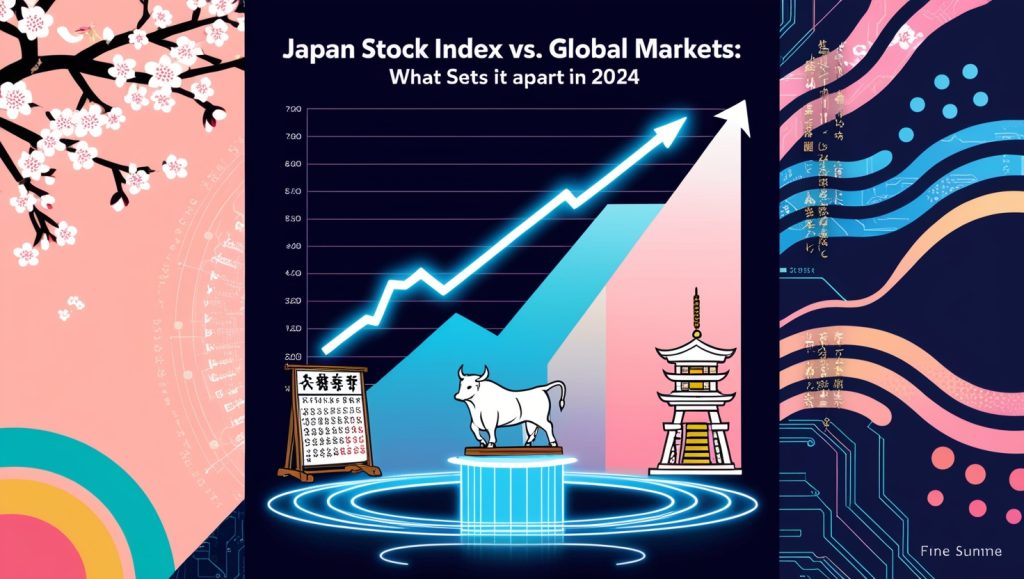
Japan Stock Index vs. Global Markets: What Sets It Apart in 2024
Japan Stock Index vs. Global Markets: What Sets It Apart in 2024-As investors look for opportunities to diversify their portfolios, understanding how different stock markets perform is essential. One market that often stands out in discussions about global investment strategies is the Japan Stock Index. While Japan’s economy is known for its stability and innovation, its stock market offers unique characteristics compared to other global markets. In this article, we will explore the differences between the Japan Stock Index and other major global markets in 2024, shedding light on the factors that set Japan apart and what investors need to know.
What is the Japan Stock Index?
The Japan Stock Index refers to the collection of indices that track the performance of Japan’s stock market, with the most notable being the Nikkei 225 and Topix. These indices provide an overview of Japan’s largest and most influential companies, which span a variety of industries, from automotive giants like Toyota to technology leaders like Sony.
The Nikkei 225 consists of 225 companies and is price-weighted, meaning companies with higher stock prices have more influence on the index. On the other hand, the Topix includes all the companies in the First Section of the Tokyo Stock Exchange (TSE) and is capitalization-weighted, where the size of the company determines its impact on the index.
Key Features of the Japan Stock Index

The Japan Stock Index offers a distinctive investment opportunity due to several factors:
1. Technological and Automotive Giants
Japan is home to some of the world’s leading companies in technology and automotive manufacturing. Companies like Sony, Toyota, and Honda not only drive Japan’s economy but are influential in global markets. These large corporations make up a significant portion of the Japan Stock Index, providing investors with access to industries that are at the forefront of innovation.
2. Stability and Low Volatility
Compared to many emerging markets, Japan’s stock market is often seen as more stable and less volatile. The country’s economy is well-established, with a strong industrial base, high levels of corporate governance, and a stable political environment. This makes the Japan Stock Index attractive to conservative investors looking for steady long-term growth. (Read More: Decoding the Dynamics of Business: A Holistic Perspective)
3. Aging Population and Demographic Trends
One unique aspect of Japan’s stock market is the impact of the country’s aging population. Japan has one of the oldest populations in the world, and this demographic trend influences the types of industries that dominate the market. For example, healthcare, robotics, and automation have seen significant growth as companies adapt to the changing needs of the population. Investors in the Japan Stock Index are increasingly eyeing these sectors for growth potential.
Global Markets: A Broader Perspective

While the Japan Stock Index offers a distinct set of opportunities, it is essential to understand how it compares to other global markets. Let’s examine some of the key markets globally and how they differ from Japan’s stock market in 2024.
1. The U.S. Stock Market (S&P 500)
The S&P 500 is one of the most widely followed stock indices in the world, representing 500 of the largest publicly traded companies in the United States. Compared to the Japan Stock Index, the S&P 500 is more diverse, with a heavy emphasis on technology, healthcare, and consumer services. U.S. tech giants like Apple, Microsoft, and Google’s parent company Alphabet drive a large portion of the market’s performance.
One key difference between the U.S. and Japan stock markets is the risk-return profile. The U.S. stock market tends to be more volatile, but it also offers higher growth potential, particularly in tech and innovation-driven industries. In contrast, the Japan Stock Index is typically less volatile but may offer slower, steadier growth. (Read More: Decoding the Dynamics of Business: A Holistic Perspective)
2. European Markets (Euro Stoxx 50)
The Euro Stoxx 50 index includes 50 of the largest companies across the Eurozone, providing a snapshot of European economic performance. European markets are generally more influenced by global trade and economic cycles than the Japan Stock Index, which has a more domestic focus. While Japan’s stock market is heavily driven by its own large corporations, the Euro Stoxx 50 features a mix of multinational companies from various sectors such as banking, energy, and consumer goods.
Europe’s focus on sustainability, green energy, and regulatory frameworks contrasts with Japan’s emphasis on technological innovation and robotics. Investors in the Japan Stock Index may find Japan’s heavy investment in automation and robotics appealing, while European investors may focus more on sustainability and energy transition.
3. Emerging Markets (MSCI Emerging Markets Index)
Emerging markets, represented by indices like the MSCI Emerging Markets Index, include countries in Latin America, Asia, and Africa. These markets tend to be more volatile than developed markets like Japan, with higher growth potential but also greater risks. Unlike the Japan Stock Index, which is largely driven by mature industries such as automotive and electronics, emerging markets are often fueled by rapidly developing sectors like technology, finance, and consumer goods.
While Japan offers relative stability and established companies, emerging markets provide opportunities in fast-growing economies, though with increased risk. Investors looking for high growth may consider emerging markets, while those prioritizing stability may lean toward the Japan Stock Index. (Read More: How to Land High-Paying Business Administration Jobs in Today’s Market)
What Sets the Japan Stock Index Apart in 2024?

As we look at global markets in 2024, several key aspects set the Japan Stock Index apart:
1. Innovation in Robotics and Automation
Japan is at the forefront of robotics and automation technology, driven by an aging population and a push for efficiency in manufacturing. Companies like Fanuc and Keyence are leading the charge in automation, making these sectors key drivers of Japan’s stock market performance. This gives Japan a unique position compared to global markets where automation is emerging but not as deeply embedded in the economy.
2. Strong Corporate Governance and Stability
Japanese companies are known for their strong corporate governance practices and long-term business strategies. This stability, combined with Japan’s low volatility, makes the Japan Stock Index appealing for conservative investors looking for consistent returns over time. In contrast, U.S. markets, while innovative, can be more susceptible to short-term volatility and speculative trading.
3. Domestic Economic Focus
Unlike many global markets, which are heavily influenced by international trade and geopolitics, Japan’s stock market is more internally focused. While global events do impact Japan, much of the performance in the Japan Stock Index comes from domestic consumption, innovation, and government policy. This makes Japan’s market somewhat insulated from some of the global risks that can affect other markets, such as trade wars or global economic slowdowns.
Conclusion article Japan Stock Index vs. Global Markets: What Sets It Apart in 2024
In 2024, the Japan Stock Index stands out in the global market landscape due to its focus on innovation, stability, and the unique challenges and opportunities posed by its aging population. While global markets like the S&P 500 and Euro Stoxx 50 offer their own strengths, Japan’s stock market remains an attractive option for investors looking for steady growth, strong corporate governance, and exposure to emerging technologies in robotics and automation. By understanding what sets the Japan Stock Index apart, investors can make more informed decisions about where to allocate their resources in a diverse and ever-changing global market.

1 thought on “Japan Stock Index vs. Global Markets: What Sets It Apart in 2024”
Comments are closed.